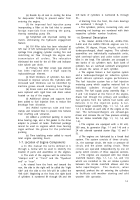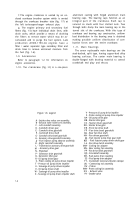TM-9-2815-200-35
ENGINE, WITH CONTAINER:TURBOSUPERCHARGED, DIESEL ,FUEL INJECTION ,90-DEGREE “V” TYPE, AIR - COOLED ,12 - CYLINDER , ASSEMBLY ;MODELS AVDS-1790-2M (2815-856-4996), AVDS-1790-2A AND AVDS-1790-2AM (2815-856-9005)
TECHNICAL MANUAL; DIRECT SUPPORT, GENERAL SUPPORT AND DEPOT MAINTENANCE MANUAL INCLUDING REPAIR PARTS AND SPECIAL TOOLS LISTS
TM-9-2815-200-35 - Page 53 of 779
e. Fuel Filters (figs. 1-3 and 1-6).
Th e
replaceable element type primary fuel filter is
mounted on the right front of the engine and
contains a fuel drain or purging line. The
replaceable element type secondary fuel filter, or
the water / separator type filter, is mounted on
the left front of the engine. Each filter has a
drain or purging line connected to separate drain
cocks mounted on a common bracket on top of
the engine.
Each drain cock is fitted with a
flexible hose for dumping drainage from the
filters. Fuel from the vehicle fuel tank passes
through the primary filter before entering the
engine fuel pump. The pump delivers fuel to the
secondary filter,
or the fuel / water separator
filter on late engines and on to the fuel injection
pump. Excess fuel bypasses the fuel injection
pump and is returned to the fuel tanks (fig. 1-
11). The fuel/ water separator filter unit has
three replaceable elements, and contains a
chamber for collecting water. The unit provides
moisture-free and uncontaminated fuel to the
injection pump.
f. Fuel Cutoff Solenoid.
An electrically
operated fuel cutoff solenoid is mounted in the
fuel injection pump. The solenoid is normally
open. A switch in the vehicle driver’s com-
partment actuates the ciruit to close the solenoid.
Closing the solenoid cuts off fuel delivery from
the fuel injection pump and stops the engine.
g.
Fuel Return Check Valve.
A fuel return
check valve (fig. 1-11) is installed between the
fuel injection pump fuel return outlet and the
fuel return hose assembly. The valve prevents
fuel flowing back to the injection pump when the
fuel supply is closed.
1-19. Manifold Air Induction and Heater
System
a. Turbosupercharger Assemblies.
Exhaust
gas driven turbosupercharger assemblies (figs. 1-
1, 1-2, and 1-4), one for each bank of cylinders,
are mounted on each side of the engine, at the
rear. The turbosuperchargers increase the
pressure of the intake air, thereby delivering a
higher density air to the cylinders as compared
with a non-supercharged engine. This higher
density air, with a proper fuel flow, increases
engine power.
1-15
Back to Top




















